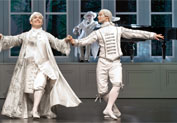OPERA SEARCH

Ariadne auf Naxos (1912 version)
(1912)Libretto by Hugo von Hofmannsthal (G,Cz,E,F,I)
Main roles: colS,dramS
Subsidiary roles: S,M,hT,2T,Bar,B
2(II=picc).2.2.2-2.1.1.0-timp.perc:glsp/tamb/tgl/cyms/SD-pft-harm-
cel-2harp-strings(6.0.4.4.2)
Abbreviations (PDF)
Boosey & Hawkes
Hoftheater, Stuttgart
Conductor: Richard Strauss
Company: Stuttgart Hoftheater
| ARIADNE | Soprano |
| BACCHUS | Tenor |
| NAIAD, a nymph | Soprano |
| DRYAD, a nymph | Contralto |
| ECHO, a nymph | Soprano |
| ZERBINETTA | Soprano |
| HARLEQUIN | Baritone |
| SCARAMUCCIO | Tenor |
| TRUFFALDINO | Bass |
| BRIGHELLA | Tenor |
Paris in the early 18th century
The Play
At his Paris home, the nouveau riche Monsieur Jourdain aspires to the social manners and skills of the true gentleman. The Music Master introduces his pupil, a young composer who has written an opera Ariadne auf Naxos to be performed that evening for Jourdain's guests, and calls some of the singers to perform musical items. The Dancing Master describes the comic entertainment Unfaithful Zerbinetta and her Four Lovers which is also to be performed, and Jourdain dances a minuet. The Fencing Master gives a lesson and Jourdain is dressed by the Tailor in his lavish new clothes. Mme Jourdain mocks her husband for his pretensions. The dissolute nobleman Dorante arrives to borrow more money and describes the beauty of the widowed Marquise Dorimène, in whose honour the dinner party is being given. In the evening Dorante escorts Dorimène to Jourdain's house, only to find the host not yet dressed. Dinner is served with Rhine salmon, saddle of mutton and a dish of larks and thrushes (accompanied by musical allusions), followed by an omelette surprise with a kitchen-boy emerging from the dish with an erotic dance. Mme Jourdain accuses Dorimène of having designs on her husband and, insulted, she leaves the table. Jourdain announces that the opera and the comedy must be performed simultaneously so that the fireworks can begin promptly at 9pm.
The Opera
The guests take their seats and the music begins. Three nymphs sing of the sadness of Ariadne, abandoned by Theseus. Ariadne bemoans her fate and Jourdain complains about her monotonous singing. Zerbinetta, with the comedians in the wings, suggests Harlequin sings a cheerful song. Taking no notice Ariadne calls for Hermes, the messenger of death. The male comedians attempt to divert her, but Zerbinetta sends them off-stage and confides with Ariadne about the plight of all women at the hands of faithless men, while declaring women should be just as fickle in love. Ariadne retreats into her cave and the comedians' entertainment takes place with Harlequin winning Zerbinetta's affections. The three nymphs herald the arrival of Bacchus, who has escaped the lures of the sorceress Circe. Ariadne believes him to be Hermes and Zerbinetta tries to prepare her for the truth. Ariadne ignores her and offers herself up to Bacchus. Dorante and Dorimène slip out of the theatre early. Zerbinetta returns to the stage with the comedians, repeating her prediction: 'a new god approaches and we surrender without a word', and the entertainment ends. Jourdain has nodded off and wakes alone, wishing he could behave as badly as the nobility and think nothing of it.
The tangled progress of Strauss and Hofmannsthal's engagement with Molière's Le Bourgeois gentilhomme resulted in four independent yet interrelated works, all assigned op.60 in his worklist:
Ariadne auf Naxos (1912 version).
Following the success of Der Rosenkavalier in 1911 Strauss and Hofmannsthal planned a further work set in the baroque period, again centred on the topical theme of the social rise of the emerging nouveau riche. Hofmannsthal homed in on Molière's play Le Bourgeois gentilhomme and Strauss was attracted to the idea of reworking the original musical material by Lully. Hofmannsthal reduced Molière's play from five acts to two, providing Strauss with opportunties for incidental music, particularly the witty dinner scene with its use of musical quotation linked to each course of food. The play was followed by a new and, for its time, radical through-composed entertainment, colliding opera seria with commedia dell'arte as an alternative to the Turkish theatricals of the original play. The original Ariadne auf Naxos had un unfortunately protracted first performance and a mixed reception thereafter, neither satisfying theatre nor opera audiences. It became increasingly clear that, outside festival conditions, the expense of hiring a theatre company and an opera company was an impractical barrier to frequent future performances.Ariadne auf Naxos (1916 version).
In 1916 Strauss and Hofmannsthal agreed to go forward with a new version. This replaced the Molière play with a new through-composed prologue, elaborating the short text in which the decision to play the opera and comedy simultaneously is revealed. The roles from the original opera were expanded into the new prologue, as was that of the composer who appeared briefly as a spoken role in the original play. Monsieur Jourdain does not appear, and a Major Domo functions as his mouthpiece. The action is transferred from Paris to Vienna, and the Prologue takes place backstage. Strauss made numerous changes in the revised opera, including limiting the difficulty, range and length of Zerbinetta's aria Grossmächtige Prinzessin, removing her preparation of Ariadne before the arrival of Bacchus, and keeping the comedians off the stage at the close other than an aside from Zerbinetta, so as to focus on the love music of Ariadne and Bacchus. The practicality and conventional operatic nature of the 1916 version meant that, perhaps unfairly, it soon superceded the 1912 version. This later version remains the one that is regularly performed today.Der Bürger als Edelmann (1917)
Hofmannsthal felt the 1916 version was too far away from his original Moliere-inspired intententions and he rightly regarded Strauss's incidental music as well worth rescuing from oblivion. In 1917 he persuaded Strauss to collaborate on turning their attention to reworking the 1912 play into a musical comedy. The drama was refashioned into three acts, removing all references to the opera and commedia dell'arte characters and reintroducing a Turkish ceremony in the final act. The incidental music from the 1912 play was retained and Strauss wrote some additional material, particularly for Act III with its opportunities for sung items and chorus. This version was not a success at its 1918 premiere, but Strauss retained an affection for the music throughout his life, choosing it as the culiminatory work at his 85th birthday celebrations in 1949.Le Bourgeois genthilhomme Suite (1920)
Hofmannsthal proposed that the 1917 version be turned into a new opera, but Strauss refused. Instead he extracted musical items to create the much-loved 25-minute orchestral suite which was premiered with great success in Vienna in January 1920. It remains a pioneering example of neoclassicism and rapidly became a popular score for ballet usage including a celebrated production by the Ballet Russes de Monte Carlo in 1944.
Comic, Romantic

Margaret Price/Sumi Jo/Gösta Winbergh/Thomas Mohr/Alfred Kuhn/Markus Schäfer/Doris Lamprecht/Brigitte Fournier/Lyon Opera Orchestra/Kent Nagano
Virgin Classics VCD5451112
